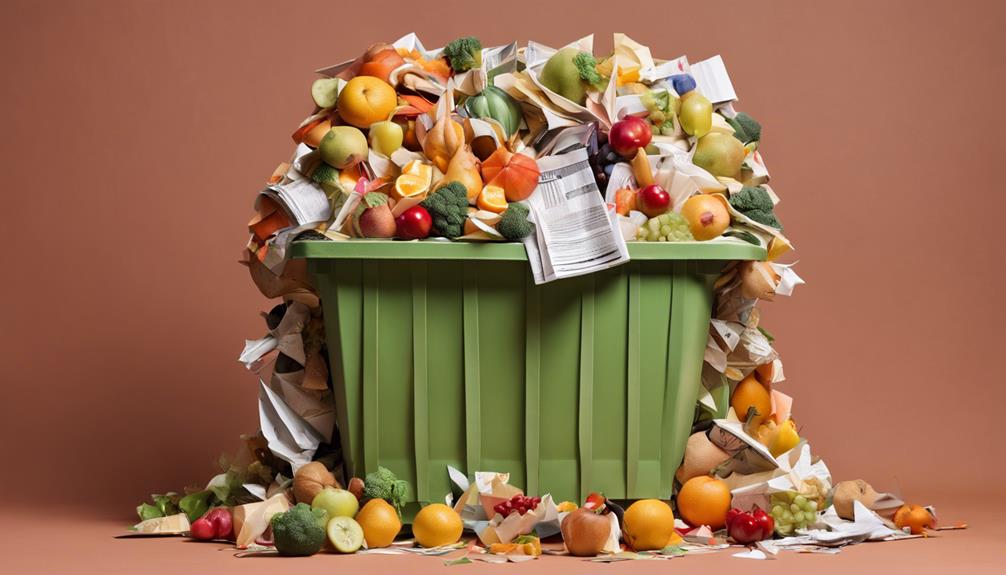Over-purchasing food leads to significant food wastage, contributing to environmental and financial consequences. Household tendencies of over-buying result in a significant amount of purchased food being wasted, impacting personal finances and the economy. The excess food in landfills produces harmful greenhouse gases, worsening climate change. Simple tactics such as making shopping lists and planning meals can help control over-buying habits. It is crucial to address these habits to reduce food wastage and its effects. Understanding the alarming reality of over-purchasing food can help you make informed choices to combat this wasteful behavior.
Key Takeaways
- Household overbuying leads to 14% of purchased food being wasted.
- Overbuying strains natural resources and generates methane in landfills.
- Financially, reducing overbuying can save households over $2,000 annually.
- Mindful shopping can cut down personal expenses and combat food waste.
- Addressing overbuying is crucial for reducing carbon emissions and environmental harm.
The Environmental Impact of Overbuying
How does overbuying food contribute to environmental degradation, and what're the consequences of this behavior?
Overbuying food leads to a significant amount of food waste, with a startling 50% of all waste occurring in households. This excess food ends up in landfills, where it decomposes and releases greenhouse gases, particularly methane, into the atmosphere. The production of greenhouse gases exacerbates climate change, making overbuying a substantial contributor to environmental degradation. In fact, addressing overbuying could potentially result in a 10% reduction in global carbon emissions, highlighting the critical role individuals play in combating climate change.
Furthermore, overbuying not only impacts the environment but also strains natural resources and incurs significant economic costs associated with food waste. By reducing overbuying habits and participating in initiatives like food-sharing platforms such as Olio, individuals can actively contribute to reducing food waste and mitigating its environmental consequences. Making conscious choices about purchasing and consuming food is essential in minimizing the environmental impact of overbuying.
Financial Consequences of Food Waste
Overbuying food can have substantial financial repercussions, impacting both individual households and the broader economy. The average American family wastes $1,500 to $2,000 annually on uneaten groceries due to food waste from overbuying. This financial impact extends beyond personal expenses, leading to significant losses for households.
By understanding the financial consequences of food waste, individuals can be motivated to make more mindful shopping decisions, not only reducing personal expenses but also contributing to a more sustainable lifestyle. Avoiding overbuying is key to minimizing the financial impact of food waste, as every dollar saved on uneaten food is a dollar that can be allocated elsewhere.
Making informed and mindful shopping decisions can't only benefit individual finances but also have a positive ripple effect on the economy as a whole. As the saying goes, 'Every penny saved is a penny earned,' and this rings especially true when it comes to curbing food waste through prudent shopping habits.
Global Statistics on Food Waste
Globally, staggering statistics reveal the alarming scale of food waste and its profound impact on the environment and economy. Annually, between 33% to 50% of all food produced worldwide goes to waste, translating to a staggering 1.3 to 2 billion tonnes of food discarded, valued at $3 to 5 trillion.
This excessive food waste doesn't just represent a financial loss; it also generates around $8 to 9 trillion in environmental and social harm. The true costs of food end up being 2 to 3 times higher than what consumers pay at retail, indicating a hidden economic burden.
In fact, the issue of food waste alone amounts to a staggering $8 to $9 trillion problem, surpassing the entire GDP of Italy. These global statistics on food waste paint a grim picture of the extensive environmental harm and economic inefficiency caused by our current food consumption and disposal patterns.
Household Overbuying Behavior Patterns
Household overbuying behavior patterns greatly contribute to the alarming scale of food waste observed globally, with households wasting an estimated 14% of all purchased food. Understanding the consumer behavior behind overbuying is essential in combating food waste. Here are some key insights into household overbuying behavior patterns:
- Overbuying contributes immensely to food waste, as 80% of discarded items are still perfectly edible, showing the extent of unnecessary purchases.
- Consumer behavior plays a pivotal role in overbuying, with around 60% of individuals admitting to buying more than required, often influenced by sales or promotions.
- The impact of overbuying can be quantified, with each person discarding an average of 17.3 pounds of food monthly due to buying in excess.
- Financial losses resulting from overbuying are substantial, with the average American family throwing away approximately $1,800 worth of food annually, highlighting the economic implications of this behavior.
Strategies to Prevent Overbuying
To prevent unnecessary food waste due to excessive purchases, implementing simple strategies can help you make more mindful shopping decisions. Start by creating a shopping list before heading to the store. Planning meals for the week and jotting down the necessary ingredients can prevent impulse buys and guarantee you only purchase what you need, reducing food waste. By sticking to your list, you can avoid overbuying and save money in the process.
According to research, the average American family throws away $1,800 of food annually due to overbuying and food waste. By adopting the habit of planning meals and making a shopping list, households can significantly diminish this wastage. Not only does this help you save money, but it also has a positive impact on the environment by reducing the 1.3 billion tonnes of food wasted globally each year.
Take charge of your shopping habits by planning ahead and buying only what you need to minimize food waste and its associated costs.
Individual Responsibility in Reducing Food Waste
When it comes to reducing food waste, individuals play a vital role in making a difference. Personal accountability in waste management is essential, as studies show that people waste an average of 17% of the food they purchase.
Understanding the impact of excess purchases and practicing mindful consumption are key aspects of taking responsibility for reducing food waste at the household level.
Personal Accountability in Waste
Taking ownership of your food consumption habits is essential in reducing food waste and contributing to a more sustainable environment. By being personally accountable for your actions, you can make a significant impact on reducing the 47% of food waste that originates from households.
To address personal overbuying of food and its detrimental effects on both your wallet and the environment, consider the following:
- Plan your meals: Create a shopping list based on what you actually need to avoid purchasing excess food that may go to waste.
- Check your pantry: Before shopping, take stock of what you already have to prevent buying duplicates.
- Practice portion control: Serve yourself reasonable portions to avoid throwing away leftover food.
- Understand expiration dates: Be aware of when your food expires to consume it before it goes bad, reducing unnecessary waste and contributing to a reduction in carbon emissions.
Role of Mindful Consumption
Mindful consumption plays a vital role in reducing food waste by encouraging conscious shopping habits and portion control. Household food waste is greatly contributed to by overbuying food, with a staggering 50% of all food waste occurring in homes.
By practicing mindful consumption, you can save over $2,000 annually by cutting down on unnecessary purchases. Being aware of your shopping habits and portion sizes is important in minimizing overbuying and subsequent food waste. Simple actions like planning meals, creating shopping lists, and utilizing leftovers can make a substantial impact.
Not only does mindful consumption benefit the environment, but it also promotes a more sustainable and cost-effective lifestyle. Remember, your individual actions matter in the fight against food waste. As the saying goes, 'Every meal you waste is a meal someone else needs.'
Impact of Excess Purchases
Minimizing excess purchases of food is essential in addressing the global food waste crisis and promoting environmental sustainability. Here are some key points to keep in mind:
- Overbuying food contributes greatly to the global food waste crisis, with household food waste accounting for half of all wasted food.
- By reducing excess purchases and food waste, the average American family could save over $2,000 annually.
- Excess purchases that lead to food waste contribute to the generation of methane in landfills, a potent greenhouse gas that exacerbates climate change.
- Individual responsibility in reducing food waste through mindful purchasing habits can have a significant impact on environmental sustainability.
Frequently Asked Questions
Why Is Overbuying Food Bad?
Overbuying food is bad because it leads to massive food waste globally, causing environmental and social harm. By avoiding overbuying, you can reduce household waste and combat climate change, making a significant impact.
Is Food Waste Actually a Problem?
Food waste is a significant problem globally. It leads to economic and environmental harm, exceeding the GDP of Italy. Addressing this issue is vital for ensuring healthy diets for all. Systemic approaches are needed for effective solutions.
What Is the Main Reason Food Is Being Wasted?
You're squandering food primarily because you're overbuying, grabbing more than you need. It's time to shop wisely, plan meals, and say no to those tempting bulk deals. Be mindful, reduce waste.
How Much Food Waste Is Shocking Statistics?
You'd be surprised to learn that shocking statistics reveal 33% to 50% of all food being wasted annually, totaling 1.3 – 2 billion tonnes globally. The true cost of this waste is 2x to 3x higher than retail prices, causing $8 – 9 trillion in environmental and social harm.
How Does Overbuying Food Relate to Being a Guilty Animal Owner?
Overbuying food often reflects the truth about guilty animal owners. They stockpile pet food to compensate for neglected care. The excessive buying reveals a lack of attention and responsibility. Guilty animal owners truth is often seen in the overabundance of supplies rather than the quality of care given to their pets.
Conclusion
To sum up, the impact of overbuying food goes beyond just wasting money – it contributes to environmental degradation and global food waste. By understanding the consequences of our actions and implementing strategies to prevent overbuying, we can all play a role in reducing food waste and its negative effects.
Remember, as the saying goes, 'waste not, want not.' So, be mindful of your purchases and make a difference in tackling this pressing issue.









